|
|
|
Sort Order |
|
|
|
Items / Page
|
|
|
|
|
|
|
| Srl | Item |
| 1 |
ID:
180005
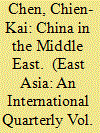

|
|
|
|
|
| Summary/Abstract |
There is an ongoing debate about whether China’s growing economic presence in the Middle East will eventually make it more politically assertive on the Middle Eastern affairs. This paper demonstrates, from a theoretical perspective of “path dependence,” that China’s promotion of the “Five Principles of Peaceful Coexistence” since the 1950s as the guiding doctrine of its foreign relations has forged a “path” for China to follow, along which it has made and repeated promises against interventionism and imperialism to other countries including the Middle Eastern ones. It, in turn, has created a situation where moving away from that “path against interventionism and imperialism” will cause huge damage to China’s reputation as a reliable non-interventionist partner to the Middle Eastern countries, and the “Global South” in general. As a result, China has refrained, and will arguably continue to refrain, from being too politically assertive on the Middle Eastern affairs.
|
|
|
|
|
|
|
|
|
|
|
|
|
|
|
|
| 2 |
ID:
163379
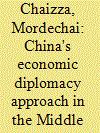

|
|
|
|
|
| Summary/Abstract |
This study analyses China’s economic diplomacy approach in the Middle East conflicts in order to explore the following question: How does China use diplomatic means to protect and pursue commercial investments, economic assets, and economic tools, and to advance its foreign policy goals in the Middle East conflict zones? This study argues that despite its adherence to the principle of non-intervention, Beijing’s economic diplomacy has a more flexible and pragmatic interpretive approach. Chinese economic diplomacy in the Middle East uses its diplomatic resources to intervene as needed to safeguard its investments and assets, and utilises economic incentives to promote its well-defined foreign policy goals in the region’s hotspots.
|
|
|
|
|
|
|
|
|
|
|
|
|
|
|
|
| 3 |
ID:
168169
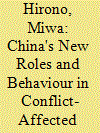

|
|
|
|
|
| Summary/Abstract |
China's view on the sanctity of state sovereignty has slowly but inexorably been transformed, and the country has found it difficult to continue to adhere to the principles of non-interference and non-intervention with the same degree of rigour as during the Cold War era. This special section will explore what the principles mean to China today; why and how Beijing has become active in peacebuilding and conflict mediation; and what implication China's approach to the principles has for its position in the global liberal order. This article sets the scene by firstly demonstrating that defining the principles has always been a political act, and secondly offering new discussions about how China's expanding economic power forced the country to more actively engage in politics of conflict-affected regions. Finally, it offers a conceptual framework to explain why and how China has become increasingly active in peacebuilding and conflict mediation.
|
|
|
|
|
|
|
|
|
|
|
|
|
|
|
|
| 4 |
ID:
083487
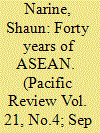

|
|
|
|
|
| Publication |
2008.
|
| Summary/Abstract |
This paper assesses the historical development of the Association of Southeast Asian Nations (ASEAN). During its 40 year history, ASEAN has achieved limited success in influencing the normative environment of Southeast Asia. ASEAN has helped shape institutional development in the Asia Pacific, particularly since the 1990s. It remains at the center of Asia Pacific regionalism. However, ASEAN's diverse membership and its need to maintain the fundamental principle of non-intervention limit its ability to reform. ASEAN's future is closely tied to its role in facilitating the emergence of China as a global power
|
|
|
|
|
|
|
|
|
|
|
|
|
|
|
|
| 5 |
ID:
176536


|
|
|
|
|
| Summary/Abstract |
In a field that is so loosely theorised, an investigation into intra-GCC conflict is both apposite and challenging. Empirically, interventions by Gulf states have proliferated across the GCC and MENA since 2011. This Special Issue seeks to fill a void in scholarship by looking at the ongoing crisis through the lens of norms. A hypothesised ‘normlessness’ has taken root: a collapse of (local) guiding principles, some even laid down by member states. Disregard for norms of non-intervention, popular sovereignty, mediation, alliance-making and social solidarity poses risks for (sub)regional stability. Provisionally, one notable weakness lies in prescriptive and proscriptive (regulative) norms pertaining to intra-GCC rules of engagement.
|
|
|
|
|
|
|
|
|
|
|
|
|
|
|
|
| 6 |
ID:
156973
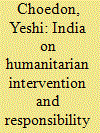

|
|
|
|
|
| Summary/Abstract |
India’s opposition to humanitarian intervention has been influenced by its colonial experience and its predisposition towards the principles of sovereignty and non-intervention. However, India did not adopt a strident opposition in the post-Cold War due to the changed power configuration. The article discusses how India adopted a cautious approach and yet used every opportunity to remind the international community the baleful effect of intervention in the internal affairs. After securing concession to a considerable extent on the ambitious Responsibility to Protect (R2P) and when most of the countries showed an inclination to accept humanitarian intervention in the form of ‘R2P’ at the UN summit in 2005, India grudgingly went along accepting it. India participated in the deliberation on the implementation of R2P and took its stand on various crises in which R2P was evoked. The experience of NATO’s Libya operation under R2P was regarded as substantiation of India’s apprehension of the misuse of the concept, and India reverted its position to the sceptical view of humanitarian intervention/R2P. By mere complaining about the mixing of peace enforcement with peacekeeping, when the United Nations deployed ‘intervention brigade’ for the protection of civilians, India lost the opportunity to take the initiative to propose a new mechanism to deal with the humanitarian crisis in atrocious internal conflicts.
|
|
|
|
|
|
|
|
|
|
|
|
|
|
|
|
| 7 |
ID:
124133
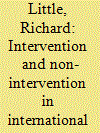

|
|
|
|
|
| Publication |
2013.
|
| Summary/Abstract |
This article aims to show that from the end of the eighteenth century, international order began to be defined in terms of ground rules relating to non-intervention and intervention, with the former being prioritised over the latter. After the Napoleonic wars, within continental Europe there was an attempt to consolidate an intervention ground rule in favour of dynastic legitimacy over the right of self-determination. By contrast, the British and Americans sought to ensure that this ground rule was not extended to the Americas where the ground rule of non-intervention was prioritised. During the nineteenth century, it was the Anglo-American position which came to prevail. Over the same period international order was increasingly bifurcated with the non-intervention ground rule prevailing in the metropolitan core and with the intervention ground rules prevailing in the periphery. This article, however, only focuses on the metropolitan core and draws on two case studies to examine the non-intervention ground rule in very different circumstances. The first examines the British response to the American Civil War in the 1860s during an era of stability in the international order. The second explores the British Response to the Spanish Civil War in the 1930s when the international order was very unstable and giving way to a very different international order.
|
|
|
|
|
|
|
|
|
|
|
|
|
|
|
|
| 8 |
ID:
079906


|
|
|
|
|
| Publication |
2007.
|
| Summary/Abstract |
Can interventions be used to assist oppressed peoples in overthrowing their governments? According to the influential non-interventionist arguments of J.S. Mill and Michael Walzer, reform interventions are incompatible with a principle of national self-determination. This article challenges Mill and Walzer, arguing that, in limited cases, interventions could in principle support revolutionary movements in such a way as to facilitate democratic transition. It does so by tracing a lack of conceptual clarity back to Mill's argument in `A Few Words on Non-Intervention'. In particular, it is argued that Mill's and consequently Walzer's account of domestic revolutionary conflicts fails to distinguish the salience of military from properly political forces. Mill's Considerations on Representative Government provides the starting point for a clearer set of distinctions through which to reconstruct the principle of non-intervention on a stronger footing
|
|
|
|
|
|
|
|
|
|
|
|
|
|
|
|
| 9 |
ID:
176552
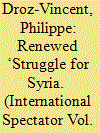

|
|
|
|
|
| Summary/Abstract |
Syria is generally considered a case of non-intervention. One of the dominant (since the 1990s) kinds of intervention, namely multilateral humanitarian intervention, failed, as did other attempts by a select group of countries to implement a ‘red line’ concerning the use of chemical weapons. However, in this case, there is no sharp dichotomy between intervention and non-intervention. In lieu of an intervention that would tilt the balance and coordinate help to halt massacres, various rival and uncoordinated international and regional interventions overlapped over time, fuelling a market for violence. ‘Weakened interventionism’, as opposed to principled and hierarchical intervention, has manifested itself in Syria in a model recalling “the struggle for Syria” of the 1960s in a new, contemporary setting.
|
|
|
|
|
|
|
|
|
|
|
|
|
|
|
|
| 10 |
ID:
124732
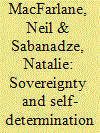

|
|
|
|
|
| Publication |
2013.
|
| Summary/Abstract |
This article discusses the historical evolution of norms of sovereignty, non-intervention, territorial integrity, and self-determination in international relations. It shows the degree to which their meanings and weight have varied and considers the bumpy historical relationship between international norms and practice. The twentieth century witnessed increasing tension between the hardening of sovereignty and non-intervention norms and the development of international human rights norms. The article then discusses normative inconsistencies and the variability of application of norms in practice in the post-Cold War era. It concludes by suggesting ways in which international society might mitigate these inconsistencies and the confusion that attends them
|
|
|
|
|
|
|
|
|
|
|
|
|
|
|
|
| 11 |
ID:
124136
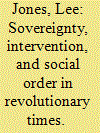

|
|
|
|
|
| Publication |
2013.
|
| Summary/Abstract |
This article explores how sovereignty and (non-)intervention are implicated in the (re)production of specific social orders. Sovereignty and the non-interference principle circumscribe 'domestic' politics from 'the international', defining who is legitimately included or excluded from the struggles that determine political and social orders. State managers seek to admit forces and resources favourable to the order they are seeking to create, whilst excluding those deleterious to it. In revolutionary periods, however, these attempts to 'cage' social relations often crumble as transnational forces engage in fierce, multifaceted conflicts overlapping territorial borders. In such circumstances, both norms of non-interference and practices of intervention may be used by dominant forces to help contain the spread of sociopolitical conflict and to strengthen their hand in the struggle to (re)define social order. Sovereignty regimes are thus shaped by the strategies and ideologies of the various social groups locked in conflict at a particular historical moment. This argument is illustrated through the case of Cold War Southeast Asia, where sovereignty and intervention were both used to stabilise capitalist social order and curtail transnational, radical threats from below.
|
|
|
|
|
|
|
|
|
|
|
|
|
|
|
|
| 12 |
ID:
168170
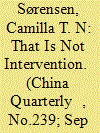

|
|
|
|
|
| Summary/Abstract |
There is among Chinese international relations scholars an intense debate about how China can protect and promote Chinese global presence and interests while at the same time continue to adhere to the principle of non-intervention. New concepts, distinctions and approaches are developing as the debate progresses. The current Chinese foreign and security policy practice reflects a more flexible and pragmatic Chinese interpretation – and implementation – of the principle of non-intervention with different degrees and types of intervention. This article explores the search for “legitimate great power intervention” characterizing both the debate among Chinese international relations scholars and the current Chinese foreign and security policy practice, and uses this case as the departure point for a more general discussion of the drivers of change – and continuity – in Chinese foreign and security policy.
|
|
|
|
|
|
|
|
|
|
|
|
|
|
|
|
|
|
|
|
|